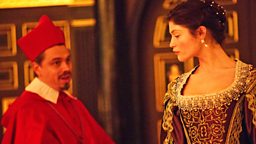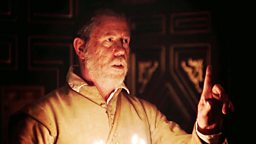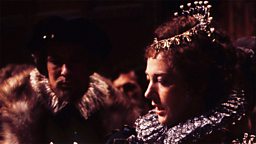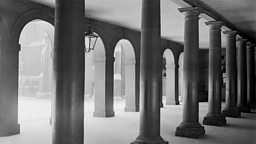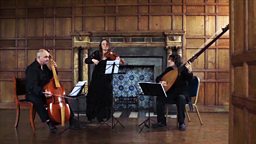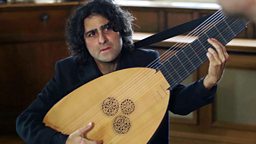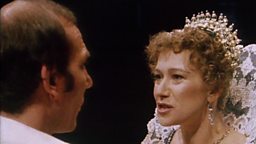Gemma Arterton took centre stage in the title role of John Webster's revenge tragedy The Duchess of Malfi at Shakespeare's Globe in January 2014.
Directed by the Globe's Artistic Director Dominic Dromgoole, the production was the inaugural performance at the newly built Jacobean-style theatre The Sam Wanamaker Playhouse.
Lit entirely by candlelight, the production evokes a murky world of plotting and intrigue.
Scenes from Malfi
The Duchess of Malfi is a gothic tale of forbidden love, intrigue, betrayal and murder. It is the most frequently performed play of the English Renaissance not written by Shakespeare.
The play tells the story of a widowed duchess who re-marries against the wishes of her malevolent brothers, propelling them to exact murderous revenge.
Act I, Scene III
In this extract the Duchess and Antonio declare their love for one another, and the Duchess takes the lead in proposing marriage.
The misery of us that are born great ! We are forc'd to woo, because none dare woo usThe Duchess
The scene takes place just after an extended lecture from her brothers - Ferdinand and The Cardinal - who are about to leave for Rome. They insist at length on the Duchess remaining unmarried, in order to avoid scandal and preserve her good name on their terms.
We first see the Duchess's great vitality in this scene, as she refuses to bow to social mores and explicitly contradicts her brothers' instructions.
This end to Act I appears a happy one on the surface, but Webster's text gives pointers to the darkness to follow: the Duchess is "not the figure cut in alabaster who kneels at my husband's tomb"; their marriage is a knot that could not be untied unless cut "with violence".

Act II, Scene III
Bosola and Antonio meet outside the palace, near the Duchess's chambers. They each accuse the other of being up to no good during the curfew, and Bosola insults Antonio.
One that were superstitious would count this ominous, when it merely comes by chanceAntonio
Antonio insistence that his nose bleed would only bother "one that were superstitious”, that "it merely comes by chance" and is a "mere accident" shows that actually the omen disturbs him greatly.
As the audience knows that Bosola is a spy on the hunt for their secret - particularly with Bosola's find at the end of the scene and his intention to inform the Cardinal and Ferdinand - these superstitious thoughts become more ominous.

Act III, Scene I
A considerable time has passed between Acts II and III of the play, as the Duchess has given birth to two more children.
This night, I will force confession from herFerdinand
Her marriage to Antonio is still a secret, as Bosola has still to discover the identity of the father.
In this extract from the beginning of Act III, Ferdinand's megalomaniacal tendencies are exposed to Bosola as he likens himself to an unknowable force of nature.

Act IV, Scene II
In this extract from the scene following the death of the Duchess, Ferdinand arrives and reprimands Bosola for following his orders.
And though I loath'd the evil, yet I lov'd you that did counsel it; and rather sought to appear a true servant than an honest man.Bosola
When Bosola assigns to Ferdinand the authority and blame for carrying out "this bloody sentence", the brother of the Duchess responds:
"Mine? Was I her judge? Did any ceremonial form of law doom her to not-being? Did a complete jury deliver her conviction up i'th' court?"
Ferdinand refuses to give Bosola any reward other than a pardon; his attempt to shift blame onto Bosola is another example of his attempts to maintain his ego despite his actions.
Ferdinand, in a sign of his coming madness, declares he will "go hunt the badger by owl-light" as he leaves.

Stills from The Globe production

More from BBC Arts
-

Picasso’s ex-factor
Who are the six women who shaped his life and work?
-
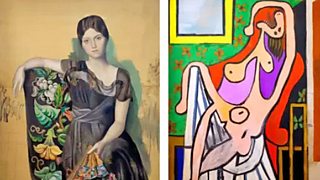
Quiz: Picasso or pixel?
Can you separate the AI fakes from genuine paintings by Pablo Picasso?
-
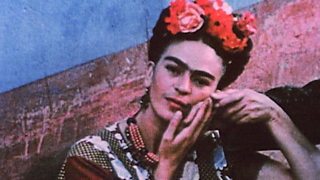
Frida: Fiery, fierce and passionate
The extraordinary life of Mexican artist Frida Kahlo, in her own words
-

Proms 2023: The best bits
From Yuja Wang to Northern Soul, handpicked stand-out moments from this year's Proms





